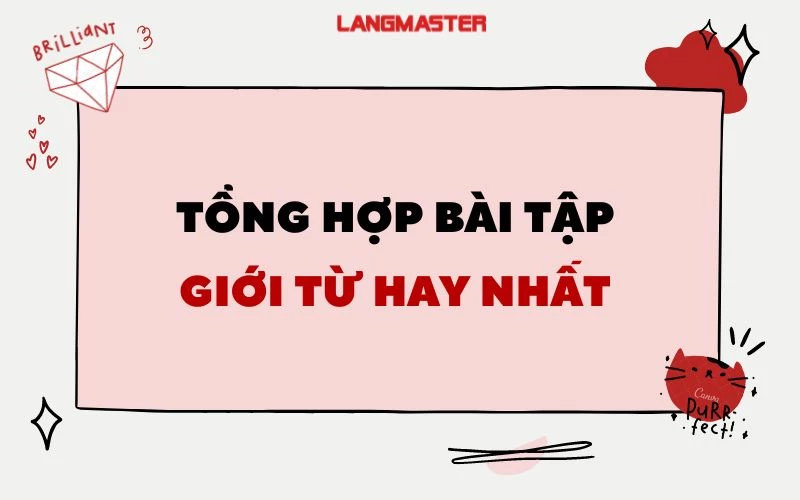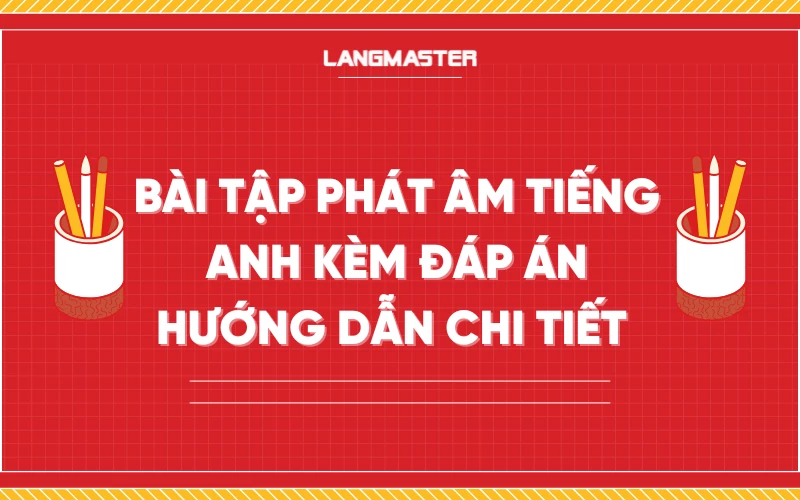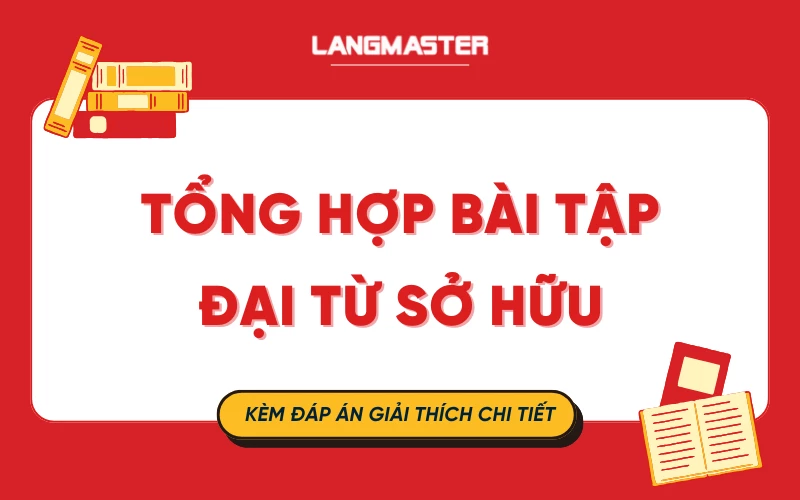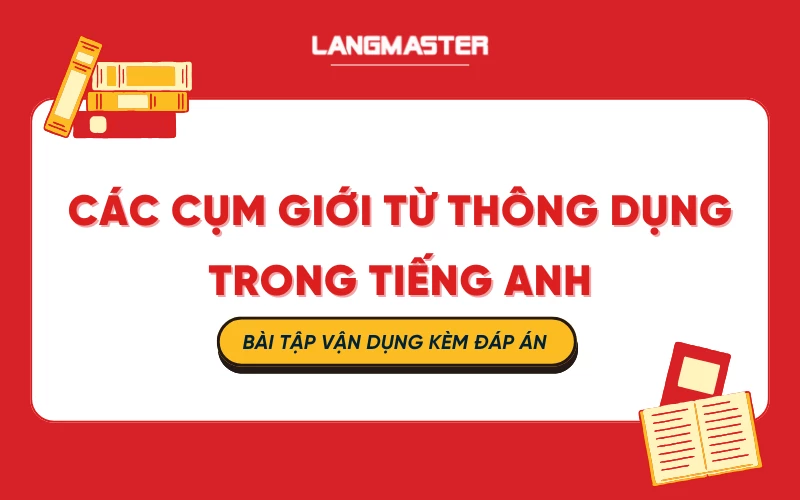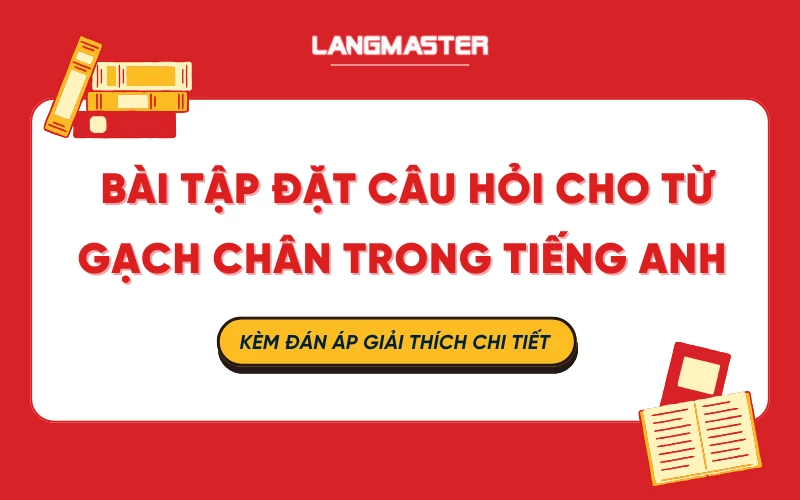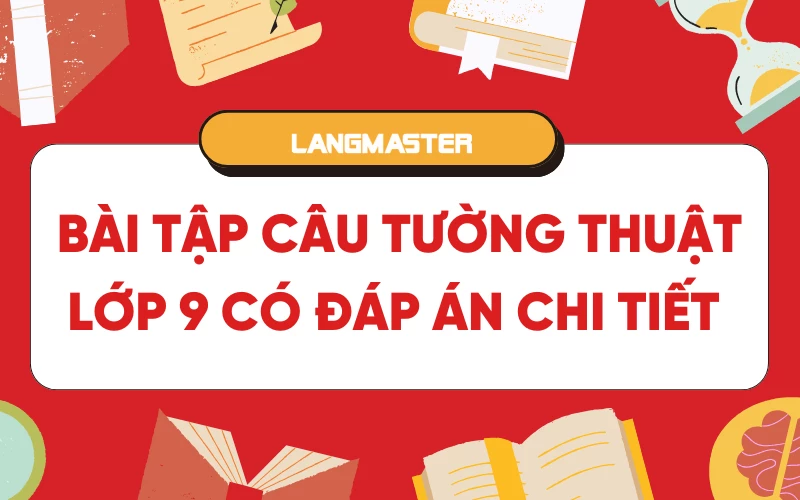Tiếng anh giao tiếp online
100+ Câu bài tập Modal Verb đầy đủ, có đáp án chi tiết nhất
Mục lục [Ẩn]
Luyện tập bài tập Modal Verb là cách tốt nhất giúp bạn luyện tập và nâng cao khả năng sử dụng động từ khuyết thiếu trong tiếng Anh. Với hơn 100+ bài tập từ cơ bản đến nâng cao, bài viết này sẽ giúp bạn làm chủ cách dùng modal verbs qua các dạng bài tập phong phú. Hãy cùng thực hành ngay để củng cố kiến thức và cải thiện kỹ năng tiếng Anh của bạn!
1. Tóm tắt kiến thức lý thuyết Modal Verb
Modal verbs (động từ khuyết thiếu) là một nhóm động từ đặc biệt trong tiếng Anh không thể đứng một mình mà luôn đi kèm với một động từ chính ở dạng nguyên thể (bare infinitive) để bổ sung ý nghĩa cho câu. Các modal verbs thường được sử dụng để diễn đạt khả năng, sự cho phép, nghĩa vụ, lời khuyên, yêu cầu, dự đoán và mong muốn.
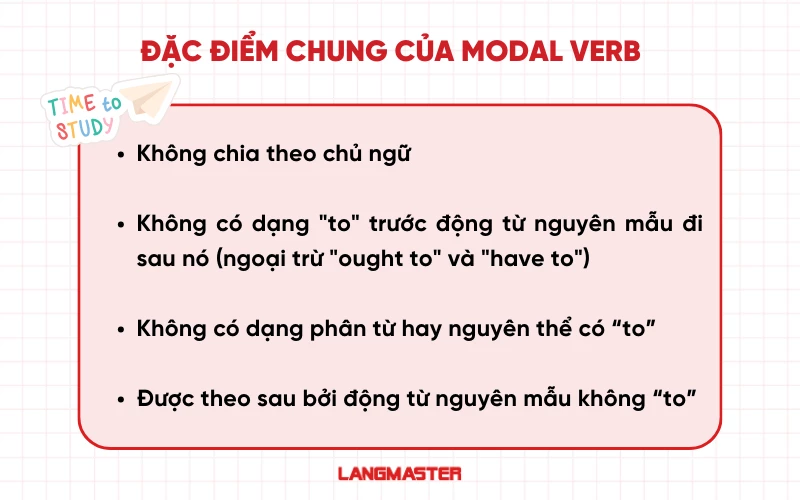
Ví dụ:
- She can play the piano well. (Cô ấy có thể chơi piano giỏi.) → Diễn tả khả năng.
- You must wear a seatbelt while driving. (Bạn phải thắt dây an toàn khi lái xe.) → Diễn tả nghĩa vụ.
Đặc điểm chung của modal verb:
- Không chia theo chủ ngữ (he, she, it…)
- Không có dạng "to" trước động từ nguyên mẫu đi sau nó (ngoại trừ "ought to" và "have to")
- Không có dạng phân từ hay nguyên thể có “to” (không có dạng "to can" hay "canned")
- Được theo sau bởi động từ nguyên mẫu không “to” (Ví dụ: can go, must study)
Cấu trúc với Modal Verb:
|
Thể câu |
Công thức |
Ví dụ |
|
Khẳng định |
S + modal verb + V (nguyên thể) |
She can dance well. (Cô ấy có thể nhảy giỏi.) |
|
Phủ định |
S + modal verb + not + V (nguyên thể) |
You must not be late. (Bạn không được đến muộn.) |
|
Nghi vấn |
(Wh) + modal verb + S + V (nguyên thể)? |
Can you help me? (Bạn có thể giúp tôi không?) |
|
Bị động |
S + modal verb + be + Vp2 |
The work must be finished on time. (Công việc phải được hoàn thành đúng hạn.) |
>> Xem thêm: Cách Sử Dụng Động Từ Khuyết Thiếu
Một số động từ khuyết thiếu thông dụng:
|
Modal Verb |
Ý Nghĩa |
Ví Dụ |
|
Can |
Khả năng, xin phép |
She can swim very well. (Cô ấy có thể bơi giỏi.) |
|
Could |
Khả năng trong quá khứ, yêu cầu lịch sự |
Could you help me, please? (Bạn có thể giúp tôi được không?) |
|
May |
Khả năng xảy ra, xin phép lịch sự |
It may rain tomorrow. (Có thể ngày mai sẽ mưa.) |
|
Might |
Khả năng thấp hơn May |
She might come late. (Cô ấy có thể đến muộn.) |
|
Must |
Bắt buộc, suy luận chắc chắn |
You must wear a seatbelt. (Bạn phải thắt dây an toàn.) |
|
Shall |
Đề xuất, lời hứa, luật lệ |
Shall we go now? (Chúng ta đi ngay chứ?) |
|
Should |
Lời khuyên, nghĩa vụ nhẹ |
You should eat more vegetables. (Bạn nên ăn nhiều rau hơn.) |
|
Will |
Dự đoán, ý chí, quyết định |
She will be here soon. (Cô ấy sẽ đến sớm.) |
|
Would |
Quá khứ của Will, yêu cầu lịch sự |
Would you like a cup of tea? (Bạn có muốn một tách trà không?) |
>> Xem thêm:
- Trọn Bộ Cách Dùng Cấu Trúc Can Could Trong Tiếng Anh
- Tất Tần Tật Cách Dùng May Might Trong Tiếng Anh
2. Lưu ý khi làm bài tập Modal verb
2.1. Hiểu rõ ý nghĩa của từng Modal Verb: Mỗi động từ khuyết thiếu có nhiều sắc thái ý nghĩa khác nhau, ví dụ:
Must có thể diễn tả sự bắt buộc hoặc suy luận chắc chắn
- You must wear a uniform. – Bạn phải mặc đồng phục
- He must be at home now. – Anh ấy chắc hẳn đang ở nhà
Trong khi đó, can diễn đạt khả năng hoặc xin phép một điều gì đó:
- She can swim. – Cô ấy có thể bơi
- Can I go out? – Tôi có thể ra ngoài không?
2.2. Không chia Modal Verb theo thì hay ngôi: Không giống như động từ thường, modal verbs không có dạng quá khứ, tương lai hay phân từ. Chúng cũng không thay đổi theo chủ ngữ. Ví dụ:
- ĐÚNG: She can dance. / They can dance.
- SAI: She cans dance.
2.3. Modal Verb luôn đi kèm động từ nguyên mẫu (bare infinitive): Động từ sau modal verb luôn ở dạng nguyên thể không “to”, ngoại trừ một số trường hợp đặc biệt như ought to và have to.
>> Xem thêm:
- Cấu Trúc Must Và Have To: Cách Dùng Và Bài Tập Có Đáp Án Hay Nhất
- Cách dùng cấu trúc Should trong tiếng Anh và bài tập vận dụng
2.4. Sử dụng cấu trúc “modal verb + have + Vp2” để diễn tả quá khứ: Khi muốn nói về một sự việc đã xảy ra trong quá khứ với modal verbs, chúng ta dùng cấu trúc modal verb + have + past participle (Vp2). Ví dụ:
- She must have forgotten her keys. (Cô ấy chắc hẳn đã quên chìa khóa.)
- You should have studied more for the test. (Bạn đáng lẽ nên học nhiều hơn cho bài kiểm tra.)
2.5. Phủ định của một số Modal Verb có nghĩa khác với thể khẳng định: Một số modal verbs khi thêm “not” vào có nghĩa khác hoàn toàn so với thể khẳng định. Ví dụ:
- Must → Must not (mustn’t): Biểu thị sự cấm đoán (You mustn’t park here. – Bạn không được đỗ xe ở đây.)
- Can → Cannot (can’t): Biểu thị không thể làm gì đó (I can’t swim. – Tôi không thể bơi.)
- May → May not: Biểu thị khả năng không xảy ra (She may not come to the party. – Cô ấy có thể sẽ không đến bữa tiệc.)
3. Tổng hợp bài tập Modal Verb từ cơ bản đến nâng cao
3.1. Dạng bài tập điền từ
Điền Modal Verb phù hợp vào chỗ trống, có lựa chọn sẵn theo đúng yêu cầu:
Bài tập 1: Mức độ cơ bản
- You .......... (should / can) listen to your teacher carefully.
- You .......... (need / may) drink more water every day.
- People .......... (mayn't / shouldn't) talk loudly in the library.
- .......... (will / would) it rain tomorrow?
- .......... (may / could) I borrow your book for a while?
- You .......... (ought to / might) visit your grandparents more often.
- You .......... (couldn't / mustn't) smoke in a hospital.
- .......... (can / should) you ride a bicycle?
- We .......... (must / might) wear uniforms at school.
- He .......... (could / must) be at home now because his car is parked outside.
- She .......... (may / must) be very tired after working all day.
- They .......... (should / can) respect their elders.
- .......... (shall / will) I help you with your bags?
- You .......... (mustn't / shouldn't) tell lies.
- .......... (may / can) I open the window?
Bài tập 2: Mức độ trung bình
- You .......... (must / should) lock the door before leaving.
- If you don’t understand, you .......... (should / could) ask your teacher for help.
- He .......... (must / might) be sleeping now because he didn’t answer the phone.
- .......... (Can / Shall) we go to the cinema tonight?
- I .......... (may / must) complete this assignment before the deadline.
- You .......... (might / must) not enter this area without permission.
- We .......... (can / should) finish the project next week.
- She .......... (could / should) have called me earlier.
- This road is very dangerous. You .......... (must / should) drive carefully.
- .......... (Will / Would) you like a cup of coffee?
- If you are not feeling well, you .......... (should / might) see a doctor.
- You .......... (mustn't / shouldn't) forget to bring your passport when traveling abroad.
- He .......... (must / might) be the one who sent the message.
- If I were you, I .......... (would / should) accept the job offer.
- You .......... (must / need) not worry about the test.
Bài tập 3: Mức độ nâng cao
- You .......... (should have / must have) called me before coming.
- If I had studied harder, I .......... (could have / should have) passed the exam.
- He .......... (must have / might have) left the office early because no one saw him.
- You .......... (shouldn't have / mustn't have) spent so much money on that bag.
- She .......... (could have / might have) been late due to traffic.
- I .......... (may / might) not attend the meeting tomorrow due to an urgent task.
- You .......... (must have / should have) known that he was lying.
- If he had left earlier, he .......... (would have / might have) caught the bus.
- The weather forecast said it .......... (will / might) snow tomorrow.
- You .......... (could have / should have) told me about the change of plans.
- He .......... (must have / can’t have) forgotten my birthday because he always remembers it.
- You .......... (shouldn't have / mustn't have) ignored his advice; he was right.
- She .......... (could have / must have) missed the train because she is not here yet.
- If I had prepared better, I .......... (would have / could have) won the competition.
- He .......... (must have / might have) lied about his qualifications.
>> Xem thêm:
- Bài tập câu tường thuật lớp 9 có đáp án chi tiết theo các dạng
- Tổng hợp bài tập đại từ sở hữu kèm đáp án giải thích chi tiết
ĐÁP ÁN:
Bài tập 1:
- should
- need
- shouldn't
- will
- may
- ought to
- mustn't
- can
- must
- must
- must
- should
- shall
- mustn't
- may
Bài tập 2:
- must
- should
- might
- Shall
- must
- must
- should
- should
- must
- Would
- should
- mustn't
- must
- would
- need not
Bài tập 3:
- should have
- could have
- must have
- shouldn't have
- might have
- might
- must have
- would have
- might
- should have
- can’t have
- shouldn't have
- must have
- could have
- must have
3.2. Bài tập Modal Verb - trắc nghiệm
Chọn đáp án đúng nhất để hoàn thành các câu sau.
Bài tập 1: Mức độ cơ bản
- She ___ swim when she was five years old.
a) can
b) could
c) must - You ___ not smoke in public places.
a) must
b) mustn’t
c) shouldn’t - ___ I use your phone for a moment?
a) Shall
b) May
c) Will - Students ___ wear school uniforms.
a) must
b) might
c) would - He ___ be at home right now; I just saw him at the supermarket.
a) must
b) can
c) should - You ___ take an umbrella. It might rain.
a) must
b) should
c) can - ___ you help me with my bags, please?
a) Can
b) Shall
c) Must - If you feel sick, you ___ see a doctor.
a) should
b) must
c) might - We ___ leave now if we want to catch the train.
a) must
b) should
c) could - ___ I borrow your pen for a moment?
a) Will
b) May
c) Shall - When I was young, I ___ run 5 km without getting tired.
a) can
b) could
c) must - You ___ drive too fast; it's dangerous.
a) must
b) mustn’t
c) shouldn’t - He ___ be sleeping now because he didn’t answer my call.
a) must
b) might
c) should - ___ we go out for dinner tonight?
a) May
b) Shall
c) Will - You ___ eat more vegetables to stay healthy.
a) should
b) can
c) might
Bài tập 2: Mức độ trung bình
- If you want to pass the exam, you ___ study harder.
a) must
b) should
c) may - He ___ have left already because his car is not in the parking lot.
a) must
b) might
c) should - If I were you, I ___ take that job offer.
a) will
b) would
c) shall - This road is very slippery; you ___ drive carefully.
a) must
b) should
c) can - ___ I help you with your bags?
a) Can
b) Shall
c) Must - They ___ be at the airport now. Their flight is in 30 minutes.
a) must
b) should
c) can - He ___ have forgotten our meeting because he never misses appointments.
a) must
b) might
c) could - She ___ take a taxi; otherwise, she will be late.
a) must
b) should
c) might - The baby is crying. He ___ be hungry.
a) must
b) could
c) may - We ___ go to the beach if the weather is nice.
a) will
b) may
c) can - You ___ not enter this room without permission.
a) should
b) must
c) mustn’t - I ___ finish my homework before going out.
a) must
b) should
c) could - He ___ be the one who stole the money, but I’m not sure.
a) must
b) might
c) can - If you are tired, you ___ take a rest.
a) may
b) can
c) should - She ___ call me as soon as she arrives.
a) should
b) must
c) might
Bài tập 3: Mức độ nâng cao
- He ___ have missed the train; he is always late.
a) must
b) might
c) should - If I had studied harder, I ___ have passed the exam.
a) would
b) must
c) can - She looks happy; she ___ have received good news.
a) must
b) could
c) may - You ___ have told me that you were coming!
a) must
b) should
c) would - If you had left earlier, you ___ have caught the bus.
a) must
b) could
c) should - He ___ not have stolen the money; he was with me all the time.
a) can
b) must
c) could - We ___ have lost our way; this doesn’t look familiar.
a) might
b) must
c) should - She ___ have forgotten our appointment; I reminded her yesterday.
a) might
b) can’t
c) should - If I had prepared better, I ___ have won the competition.
a) should
b) could
c) must - He ___ have been lying about his qualifications.
a) must
b) might
c) should - You ___ not have been so rude to her.
a) could
b) should
c) must - He ___ have called us if he needed help.
a) should
b) must
c) would - This machine is dangerous; you ___ not operate it without proper training.
a) must
b) should
c) can - She ___ have taken the wrong bus.
a) must
b) might
c) could - You ___ have seen him; he was at the party.
a) must
b) should
c) might
ĐÁP ÁN:
Bài tập 1:
- b) could
- b) mustn’t
- b) May
- a) must
- a) must
- b) should
- a) Can
- a) should
- a) must
- b) May
- b) could
- c) shouldn’t
- a) must
- b) Shall
- a) should
Bài tập 2:
- b) should
- a) must
- b) would
- b) should
- b) Shall
- a) must
- a) must
- a) must
- a) must
- b) may
- c) mustn’t
- a) must
- b) might
- c) should
- b) must
Bài tập 3:
- a) must
- a) would
- a) must
- b) should
- b) could
- a) can’t
- a) might
- b) can’t
- b) could
- a) must
- b) should
- c) would
- a) must
- b) might
- a) must

3.3. Bài tập chia động từ
Hoàn thành các câu sau bằng cách chia động từ trong ngoặc theo đúng cấu trúc của Modal Verb.
Bài tập 1: Mức độ cơ bản
- She (can / swim) when she was five years old.
- You (must / wear) a seatbelt while driving.
- He (may / be) at home now because his car is parked outside.
- You (should / drink) more water every day.
- I (might / call) you later if I have time.
- You (must not / park) here; it is a no-parking zone.
- We (could / play) outside when we were younger.
- They (should / listen) to the teacher carefully.
- The baby is crying. He (must / be) hungry.
- I (can / help) you with your homework if you want.
- You (ought to / visit) your grandparents more often.
- He (might / come) to the party, but he is not sure.
- You (must not / forget) to lock the door before leaving.
- She (can / speak) three languages fluently.
- I (shall / go) to the grocery store now.
Bài tập 2: Mức độ trung bình
- If you feel sick, you (should / see) a doctor.
- He (must / have) already left because the house is empty.
- You (should not / eat) too much junk food.
- She (could / study) abroad next year if she gets a scholarship.
- We (may / have) a meeting tomorrow afternoon.
- He (must / finish) the project before the deadline.
- I (can / hear) someone talking outside.
- You (ought to / respect) your elders.
- He (must / work) late today because his boss asked him to stay.
- We (should / take) an umbrella; it looks like it might rain.
- The students (can / ask) the teacher if they have any questions.
- I (might / go) to the cinema if I finish my homework early.
- You (must not / use) your phone in the library.
- He (should / be) more careful when crossing the street.
- You (must / not / drive) without a valid license.
Bài tập 3: Mức độ nâng cao
- He (must / forget) my birthday because he didn’t call me.
- If you had worked harder, you (could / pass) the exam.
- She (might / leave) early because she looked tired.
- You (should / tell) me the truth before.
- They (must / arrive) home by now; it’s already midnight.
- If I had studied more, I (would / get) a better grade.
- He (could not / finish) the race because he injured his leg.
- We (might / be) lost; this place doesn’t look familiar.
- She (must / lose) her keys because she can’t find them.
- If he had trained more, he (might / win) the competition.
- You (should / apologize) for being late.
- He (must / be) very tired after working all day.
- She (might / forget) our meeting; I should call her.
- If I had saved more money, I (could / travel) to Europe.
- You (should not / spend) so much money on unnecessary things.
>> Xem thêm:
- 150+ Bài tập Was, Were (thì quá khứ đơn) kèm đáp án chi tiết nhất
- 100+ Bài tập trắc nghiệm câu bị động từ cơ bản đến nâng cao (có đáp án)
ĐÁP ÁN:
Bài tập 1:
- could swim
- must wear
- may be
- should drink
- might call
- must not park
- could play
- should listen
- must be
- can help
- ought to visit
- might come
- must not forget
- can speak
- shall go
Bài tập 2:
- should see
- must have left
- should not eat
- could study
- may have
- must finish
- can hear
- ought to respect
- must work
- should take
- can ask
- might go
- must not use
- should be
- must not drive
Bài tập 3:
- must have forgotten
- could have passed
- might have left
- should have told
- must have arrived
- would have gotten
- could not have finished
- might be
- must have lost
- might have won
- should apologize
- must be
- might have forgotten
- could have traveled
- should not have spent
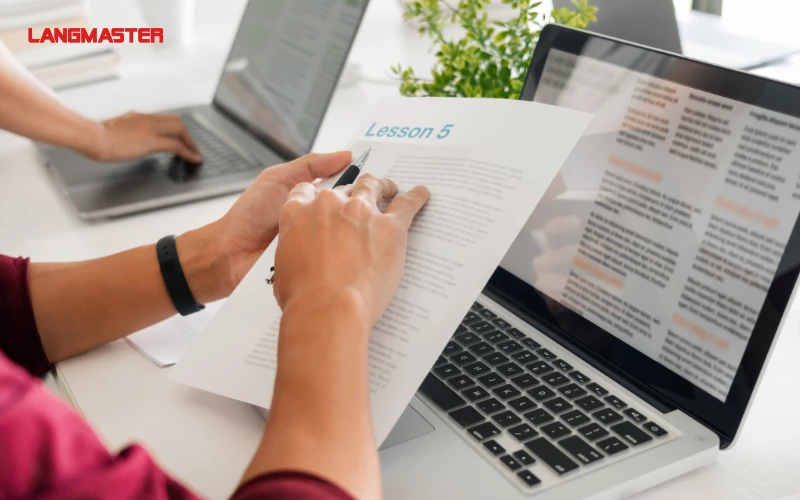
3.4. Dạng bài tập viết lại câu sao cho nghĩa không đổi
Bài tập 1: Mức độ cơ bản
Viết lại các câu sử dụng Modal Verb phù hợp
- He can answer the question.
→ ________________________________________________ - She wouldn’t carry the table.
→ ________________________________________________ - You should close the window.
→ ________________________________________________ - We might play cards.
→ ________________________________________________ - You should wash the car.
→ ________________________________________________ - It is necessary for students to wear uniforms.
→ ________________________________________________ - I am able to swim across the river.
→ ________________________________________________ - It is a good idea for you to bring an umbrella.
→ ________________________________________________ - Is it possible for me to use your phone?
→ ________________________________________________ - You are not allowed to smoke in the library.
→ ________________________________________________ - It is possible that they will arrive late.
→ ________________________________________________ - It is not necessary for you to attend the meeting.
→ ________________________________________________ - You are required to wear a seatbelt while driving.
→ ________________________________________________ - I suggest that you study harder.
→ ________________________________________________ - I request permission to leave early.
→ ________________________________________________
Bài tập 2: Mức độ trung bình
Viết lại các câu sử dụng Modal Verb phù hợp
- Maybe she forgot about our appointment.
→ ________________________________________________ - It was necessary for you to bring your ID card.
→ ________________________________________________ - It is against the rules to use mobile phones in class.
→ ________________________________________________ - I am certain that she has already finished her work.
→ ________________________________________________ - It is possible that they went to the park.
→ ________________________________________________ - It is advisable for you to revise your notes before the exam.
→ ________________________________________________ - I strongly suggest that you apologize to her.
→ ________________________________________________ - It is not necessary for you to wait for me.
→ ________________________________________________ - I request permission to borrow your book.
→ ________________________________________________ - There is a chance that she will be promoted soon.
→ ________________________________________________ - He had the ability to solve complex math problems.
→ ________________________________________________ - I am sure that they didn’t see me.
→ ________________________________________________ - It was not necessary for you to bring an umbrella.
→ ________________________________________________ - It is important for employees to attend the meeting.
→ ________________________________________________ - Maybe she took the wrong bus.
→ ________________________________________________
Bài tập 3: Mức độ nâng cao
Viết lại các câu sử dụng Modal Verb phù hợp, có thể bao gồm dạng Modal Verb + Have + Vp2
- I am sure that he has seen this movie before.
→ ________________________________________________ - It was a mistake for you to spend so much money.
→ ________________________________________________ - There was no need for her to buy such an expensive dress.
→ ________________________________________________ - It is certain that they have arrived at the airport by now.
→ ________________________________________________ - You made a mistake by not telling me the truth earlier.
→ ________________________________________________ - It was unnecessary for him to bring so much luggage.
→ ________________________________________________ - I am sure that she didn’t recognize me.
→ ________________________________________________ - It is very likely that they misunderstood the instructions.
→ ________________________________________________ - I think you should have asked for permission before leaving.
→ ________________________________________________ - I am certain that she didn’t mean to hurt you.
→ ________________________________________________ - It was a mistake for him to ignore her advice.
→ ________________________________________________ - Perhaps she missed the train.
→ ________________________________________________ - It was unnecessary for us to hurry; we arrived too early.
→ ________________________________________________ - If I were you, I would have prepared better.
→ ________________________________________________ - I strongly recommend that you check your answers before submitting the test.
→ ________________________________________________
>> Xem thêm:
- Tổng hợp cấu trúc viết lại câu sao cho nghĩa không đổi và bài tập
- Cách Viết Lại Câu Điều Kiện Loại 1, 2, 3 & Bài Tập
ĐÁP ÁN
Bài tập 1:
- He is able to answer the question.
- She refused to carry the table.
- You ought to close the window.
- We may play cards.
- You ought to wash the car.
- Students must wear uniforms.
- I can swim across the river.
- You should bring an umbrella.
- May I use your phone?
- You must not smoke in the library.
- They might arrive late.
- You don’t have to attend the meeting.
- You must wear a seatbelt while driving.
- You should study harder.
- May I leave early?
Bài tập 2:
- She might have forgotten about our appointment.
- You should have brought your ID card.
- You must not use mobile phones in class.
- She must have already finished her work.
- They might have gone to the park.
- You should revise your notes before the exam.
- You must apologize to her.
- You don’t have to wait for me.
- May I borrow your book?
- She might be promoted soon.
- He could solve complex math problems.
- They can’t have seen me.
- You need not have brought an umbrella.
- Employees must attend the meeting.
- She might have taken the wrong bus.
Bài tập 3:
- He must have seen this movie before.
- You should not have spent so much money.
- She need not have bought such an expensive dress.
- They must have arrived at the airport by now.
- You should have told me the truth earlier.
- He need not have brought so much luggage.
- She can’t have recognized me.
- They must have misunderstood the instructions.
- You should have asked for permission before leaving.
- She can’t have meant to hurt you.
- He should not have ignored her advice.
- She might have missed the train.
- We need not have hurried; we arrived too early.
- You should have prepared better.
- You must check your answers before submitting the test.
Kết luận:
Luyện tập với bài tập Modal Verb không chỉ giúp bạn củng cố kiến thức mà còn nâng cao phản xạ sử dụng tiếng Anh trong thực tế. Bộ bài tập này được thiết kế từ cơ bản đến nâng cao, giúp bạn làm chủ cách dùng động từ khuyết thiếu một cách chính xác. Hãy tiếp tục thực hành mỗi ngày để thành thạo hơn! Nếu bạn cần thêm bài tập hoặc giải thích chi tiết, hãy để lại bình luận nhé!
Ngoài ra, nếu bạn đang gặp khó khăn trong việc học tiếng Anh và chưa biết bắt đầu từ đâu, Langmaster sẽ là người bạn đồng hành đáng tin cậy, giúp bạn nhanh chóng chinh phục tiếng Anh giao tiếp.
Với hơn 15 năm kinh nghiệm và đã truyền cảm hứng học tập cho hơn 800.000 học viên, Langmaster cam kết mang đến những khóa học chất lượng cao, chuẩn đầu ra theo khung CEFR. Học viên sẽ được dẫn dắt bởi đội ngũ giáo viên chuyên môn cao, áp dụng phương pháp giảng dạy độc quyền, hiện đại, giúp bạn không chỉ học nhanh mà còn sử dụng tiếng Anh một cách tự tin và hiệu quả. Hãy để Langmaster giúp bạn nâng tầm khả năng ngoại ngữ ngay hôm nay!
>> ĐĂNG KÝ CÁC KHÓA HỌC TIẾNG ANH
Nội Dung Hot
KHÓA TIẾNG ANH GIAO TIẾP 1 KÈM 1
- Học và trao đổi trực tiếp 1 thầy 1 trò.
- Giao tiếp liên tục, sửa lỗi kịp thời, bù đắp lỗ hổng ngay lập tức.
- Lộ trình học được thiết kế riêng cho từng học viên.
- Dựa trên mục tiêu, đặc thù từng ngành việc của học viên.
- Học mọi lúc mọi nơi, thời gian linh hoạt.
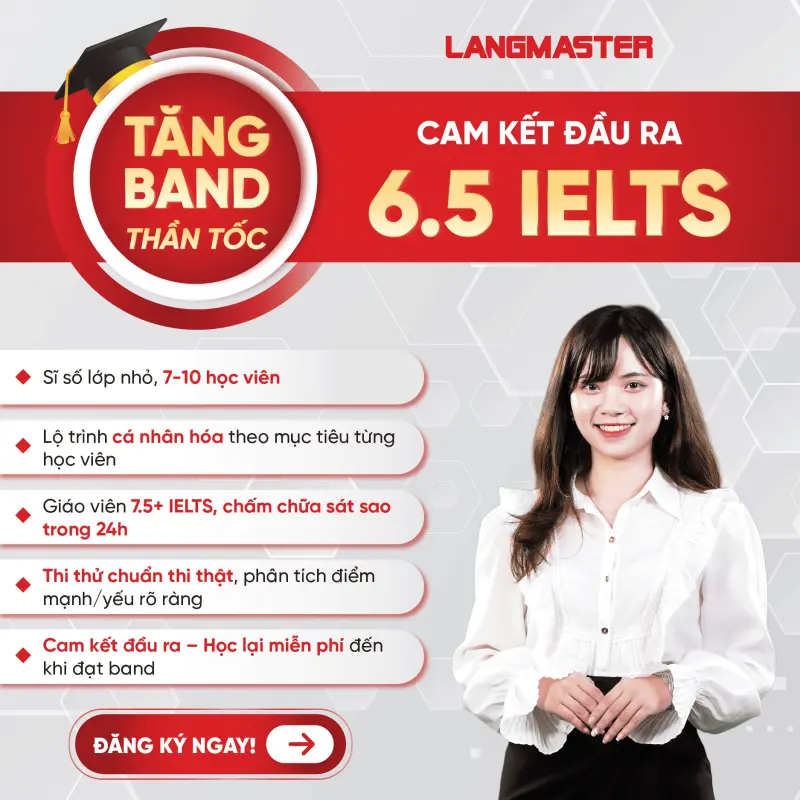
KHÓA HỌC IELTS ONLINE
- Sĩ số lớp nhỏ (7-10 học viên), đảm bảo học viên được quan tâm đồng đều, sát sao.
- Giáo viên 7.5+ IELTS, chấm chữa bài trong vòng 24h.
- Lộ trình cá nhân hóa, coaching 1-1 cùng chuyên gia.
- Thi thử chuẩn thi thật, phân tích điểm mạnh - yếu rõ ràng.
- Cam kết đầu ra, học lại miễn phí.

KHÓA TIẾNG ANH TRẺ EM
- Giáo trình Cambridge kết hợp với Sách giáo khoa của Bộ GD&ĐT hiện hành
- 100% giáo viên đạt chứng chỉ quốc tế IELTS 7.0+/TOEIC 900+
- X3 hiệu quả với các Phương pháp giảng dạy hiện đại
- Lộ trình học cá nhân hóa, con được quan tâm sát sao và phát triển toàn diện 4 kỹ năng
Bài viết khác
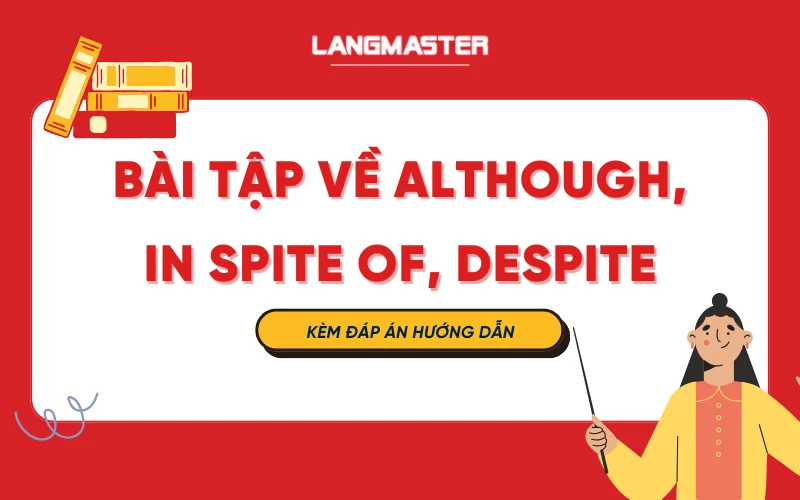
Tổng hợp bài tập về Although, In spite of, Despite kèm đáp án trọng tâm về Although, In spite of, Despite. Bài tập Although, In spite of, Despite lớp 7, bài tập lớp 9
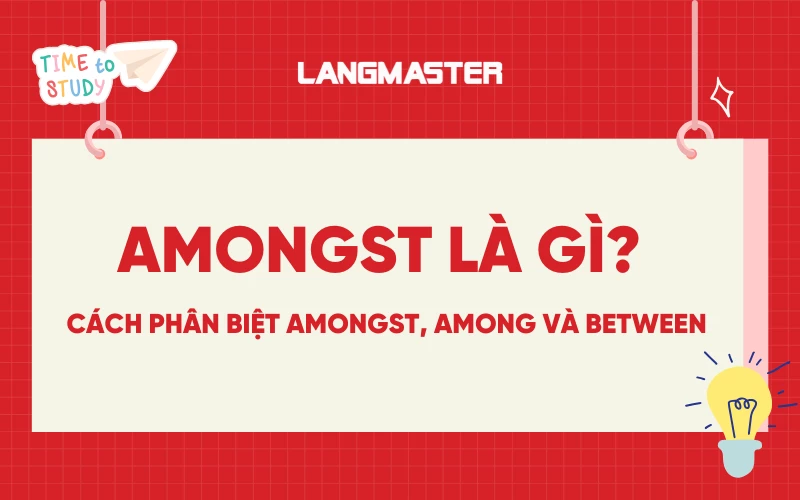
Bạn đang bối rối khi sử dụng amongst, among và between trong tiếng Anh? Trong bài viết này, Langmaster sẽ giúp bạn tìm hiểu amongst là gì, cách phân biệt với among và between kèm ví dụ chi tiết nhất.
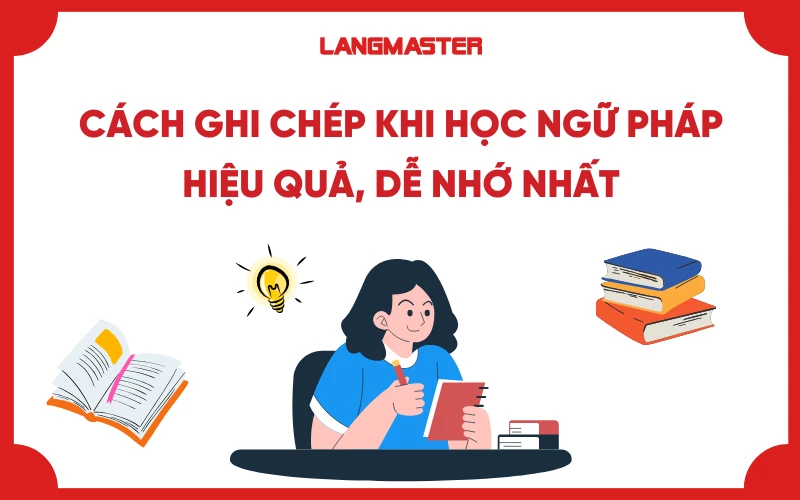
Hướng dẫn chi tiết cách ghi chép khi học ngữ pháp giúp ghi nhớ lâu, hệ thống hóa kiến thức ngữ pháp tiếng Anh và áp dụng dễ dàng vào giao tiếp, viết luận.
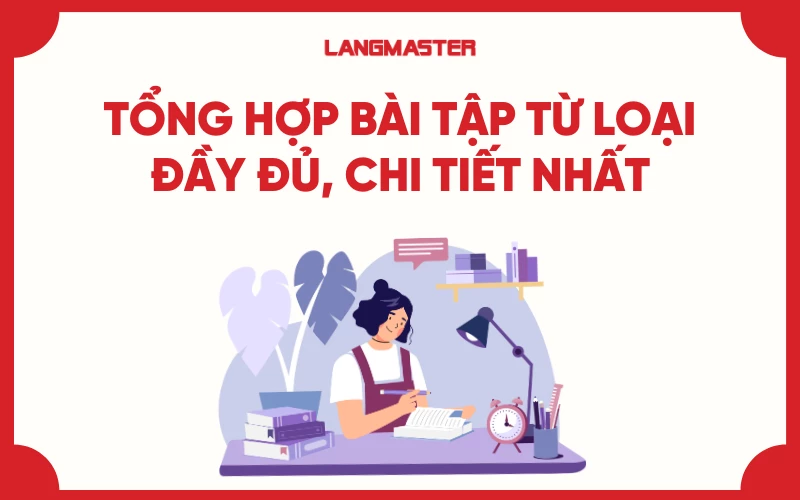
Tổng hợp 100+ câu bài tập từ loại đầy đủ, chi tiết nhất có đáp án. Hệ thống bài tập từ loại tiếng Anh cơ bản và nâng cao giúp bạn hiểu rõ cách sử dụng từ loại chính xác.
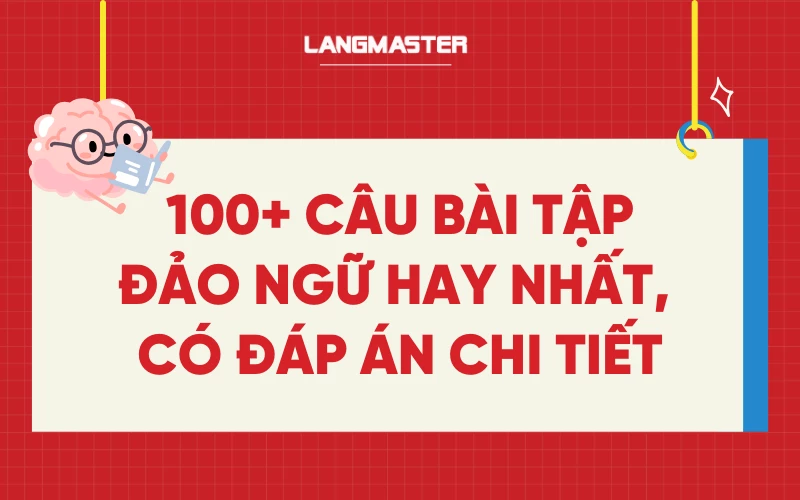
Luyện tập lý thuyết câu đảo ngữ qua bộ 100+ câu bài tập đảo ngữ hay nhất, đầy đủ các dạng kèm đáp án chi tiết.






